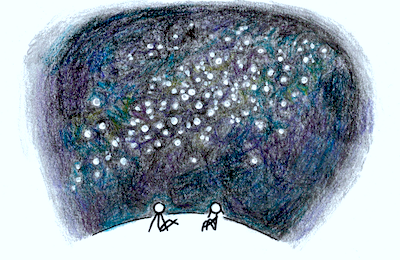A few years ago, when I was planning on writing Ultralearning, a couple well-meaning friends told me not to do it. “People don’t care about learning,” they told me.
Having reached the Wall Street Journal bestseller list, I’m glad they were wrong. Not merely for my own career as a writer, but because given how much I care about learning, it’s sad to envision a world people don’t care much about it.
I’m not fooling myself. I know that, on the whole, most people would rather debate politics than governance, read gossip rather than science or indulge in comforting superstitions rather than grapple with a complex reality. But I’m happy, at least, that the space of people interested in learning is large enough to support me and my work.
In recording dozens of interviews for Ultralearning, I often get asked why I care so much. Often the person pokes at my childhood or other life experiences that make me so interested in learning. But I prefer the flip-side of the question: how can it be that other people aren’t interested?
Why I Care About Learning
I wrote Ultralearning with a practically-minded thesis: learning pays. Being good at things matters. So even if you’re a philistine at heart, being able to efficiently acquire hard skills matters for your success in life.
But deep down, this isn’t my motivation to learn things. I’m eager to learn things because the world is deeply interesting. Far more interesting than we imagine. Maybe even more interesting than we can imagine.
Boredom, not curiosity, is the attitude that requires an explanation. How you could see glimpses of the world around you and feel that there wasn’t anything worth knowing more about is the truly baffling response. Daunted, I understand. Bewildered, I feel as well. But bored? That’s an insane response to the world around us.
Our Interesting World
Inside your body right now are a trillion cells. Each of these cells is more fantastic a machine than has ever been constructed by humans. We sit inside a galaxy of a hundred billion stars. And in a visible universe of a hundred billion galaxies.
Space and time aren’t flat. The axiom of geometry that the Greeks thought was a logical requirement turns out to not only be unnecessary, it’s not even true of the world we live in! At the base of this reality are things that would puzzle the characters of Wonderland—objects that have to spin around twice before they’re facing the same direction, wiggle in waves like the strings of guitar and bounce off cliffs instead of falling down them.
The moments we live in are an infinitesimal sliver of human experience. Millions of lives were lived and written down, billions more exist beyond that. Every problem you’ll ever face in life was faced by a thousand others, and they recorded how they solved it.
Within this life, there are more things you could possibly get insanely good at than you’ll have time for in a thousand lifetimes. Countless things you could be so passionate about that they would feel like the purpose of your entire existence. Near-infinite masterpieces you could create, theories you could invent, works you could build. The space of possibility dwarfs what even the most ambitious person could ever realize.
Boredom, that’s what I don’t understand.
Feeling Small and Weak
I remember looking up at the stars one cloudless night, remarking on how incredible it was just how far away and big everything that surrounded us was. Mentioning this, my friend told me the opposite—that the space was frightening. If it’s so big, after all, doesn’t that make us very small?
We don’t like to feel small. We don’t like to feel confused. Perhaps boredom and apathy aren’t a decision to ignore the wonders of the world around us but a reaction to them. The first explorers of new worlds saw amazing things—but those new wonders often killed them. If the space of things to learn is phenomenally vast, it’s also easy to get lost.
Some of the difference in reactions may just be innate. Openness to experience is one of the big five personality variables, and likely there’s some inherited hardwiring that separates whether the vastness of things to learn makes you feel awe or awful.
However, I suspect part of it is also the explorer’s skill. When frustration doesn’t yield fruit, it becomes an unconscious signal not to explore further. Climb into the jungle and get scratched by thorns, and you learn to stay indoors. Only if that frustration gets resolved, that you experience the joys of discovery, will the scrapes along the way not seem to matter so much.
But this, to me, suggests as well that people could be much happier and lead far more interesting lives if they knew how to learn better. Not simply the kind of knowing that comes from understanding principles like retrieval or spacing, although those do matter, but the deeper kind of knowing, when you know deep down that the world an incredibly interesting place.



 I'm a Wall Street Journal bestselling author, podcast host, computer programmer and an avid reader. Since 2006, I've published weekly essays on this website to help people like you learn and think better. My work has been featured in The New York Times, BBC, TEDx, Pocket, Business Insider and more. I don't promise I have all the answers, just a place to start.
I'm a Wall Street Journal bestselling author, podcast host, computer programmer and an avid reader. Since 2006, I've published weekly essays on this website to help people like you learn and think better. My work has been featured in The New York Times, BBC, TEDx, Pocket, Business Insider and more. I don't promise I have all the answers, just a place to start.